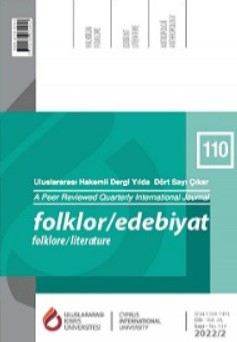Karakter Olmak İsteyen Figür: Mehpeyker ve Celâl
Figure Who Wants to Be a Character: Mehpeyker and Celâl
Author(s): Türkân YeşilyurtSubject(s): Comparative Study of Literature, Turkish Literature, Theory of Literature
Published by: Uluslararası Kıbrıs Üniversitesi
Keywords: Celâl; character; “the figure who wants to be a character”; Mehpeyker; type;
Summary/Abstract: It is a fact that the characters of the novels are generally imaginary and fictional. Yet they have a world of their own. In this respect, in order to understand the spirit of the art of the novel, it is necessary to consider the relations between the novelist and the characters of the novel. The people who carry out the intellectual and operational structure of the novel appear as “type” or “character”. In this article, apart from the people mentioned, I am talking about the “figure who wants to be a character”. I call the person in the novel who does not fit into the mold designed by the author, who wants to reveal his own independent existence and who has the potential to become a character, as a “figure who wants to be a character”. Here, I claim that Mehpeyker and Celâl, the characters of Namık Kemal’s novels İntibah and Sami Paşazade Sezai’s Sergüzeşt, are “figures who want to be characters”, and I try to support this argument. In the Tanzimat period, the literati were also intellectuals engaged in social engineering. They undertake the task of informing and directing the society in order to modernize it. However, they do not want Turkish-Islamic values to be damaged. Like many Tanzimat writers, Namık Kemal and Sami Pashazade Sezai also interfere with the content of the novel. In a society where İntibah and Sergüzeşt were written at a time when novel writing was just beginning to be learned, where men and women do not know each other outside the home, and where they cannot realize themselves as individuals, it is natural that Mehpeyker and Celâl appear as “figures who want to be characters”. In a society where the person is not seen as an individual, it would be delusional to accept that the person of the novel is a separate entity from the author.
Journal: Folklor/Edebiyat
- Issue Year: 28/2022
- Issue No: 110
- Page Range: 407-424
- Page Count: 18
- Language: Turkish

